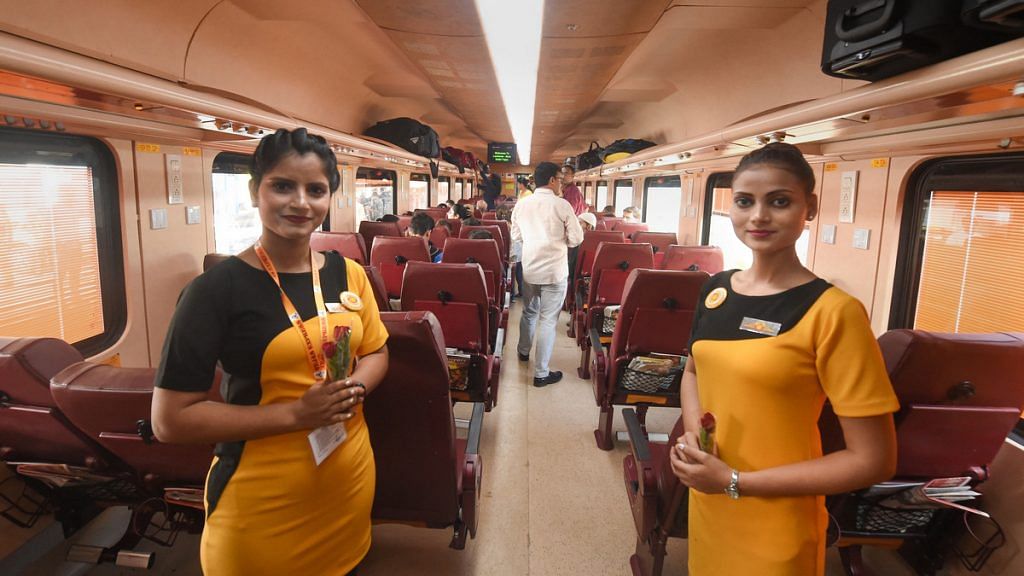New Delhi: The Tejas Express launched between Lucknow and New Delhi on 4 October is being labelled India’s first ‘private’ train. While it’s not exactly that, it is a big step towards the privatisation of the railways, and its success could eventually lead to the end of the Indian Railways’ monopoly on trains in India.
The Tejas Express will run six days a week, except Tuesdays, leaving Lucknow at 6.10 am and reaching New Delhi at 12.25 pm, with the return journey starting at 3.35 pm and ending at 10.05 pm.
The physical infrastructure of the train — locomotives, coaches, loco pilots, guards and security personnel — will remain in the Indian Railways’ hands, while the services provided, including ticketing and refunds, parcels, catering and housekeeping, will be contracted to private players through the railways’ subsidiary company IRCTC under the public-private partnership (PPP) model.
The IRCTC has signed concession agreements with private service providers, according to which operators will share their profits with the IRCTC, which in turn will pay haulage charges to the railways.
The Tejas Express, in fact, is the product of a seven-member committee set up to look into the privatisation of the railways under the chairmanship of NITI Aayog member and economist Bibek Debroy in September 2014. The committee had recommended that Indian Railways be allowed private sector competition, and suggested that all the things that aren’t germane to the operation of the railways, such as construction, be handed over to the private sector.
On-board experience
Tejas Express passengers will be greeted on-board by airline-style hostesses and stewards, who have been especially trained in courteous behaviour.
Passengers will be served three meals in the just-over-six-hour-long journey.
Another distinctive feature of the train will be refunds in case the train gets delayed — each passenger will receive Rs 100 if the train is delayed by over an hour, and Rs 250 if it is delayed by over two hours. The payments will be processed by the IRCTC on its own without passengers needing to file Ticket Deposit Receipts or TDRs.
Each passenger will be insured for a sum of Rs 25 lakh, and in case of theft or robbery, Rs 1 lakh will be paid out as compensation.
Also read: Chennai Express a hit, Railways now wants restaurant inside cast-off coaches across India
Ticketing and concessions
The Tejas Express will follow a dynamic pricing model, as decided by the IRCTC. The base fare for the Lucknow-New Delhi route will be Rs 1,125 for AC Chair Car and Rs 2,310 for Executive Chair Car, while the corresponding fares for the New Delhi-Lucknow route will be Rs 1,280 and Rs 2,450, respectively.
A senior official of the Railway Board told ThePrint: “The railways will not come in the way of IRCTC in deciding on services inside the train or fixing the fare. We have told them that if they run into losses, then they may reduce the fare (to attract more passengers). Now the market forces will decide the fares for this train.”
Railway Board executive director R.D. Bajpai added: “In terms of services offered to the passengers, IRCTC can decide everything because the reason for handing over the responsibility of running a train to a private player is to provide world-class facilities to the passengers.”
However, this does mean that passengers will not be able to avail of any concessions they would get on regular trains — which means no subsidised fares for senior citizens, cancer patients, students or even railway staff.
The Railway Board official said: “If you want to run a private train with world-class facilities, it is not possible to offer subsidised fares. Even a railway employee will not get any concession to travel in this train.”
Nor will Tejas Express have the Tatkal booking facility. The advance reservation period will be 60 days, and tickets will have to be purchased from the IRCTC website. Ticket cancellations will result in a full refund.
Is it really ‘private’?
In a word, no. The Railway Board official quoted above said: “We are still in monopoly. It is our train, our tracks and our own guards. The train is under our control.
“There are certain conditions on which we have given the train to IRCTC. But since the IRCTC has also outsourced it to private vendors, we have given some liberty in terms of deciding the menu, fare and services inside the train. However, we will keep a close watch over whatever they do. We cannot allow them to do whatever they wish to because there are certain norms to be followed.”
What next?
If the experiment proves successful, it could hasten the privatisation of the railways, starting with semi-high speed trains like Tejas and Vande Bharat Express. The railways have already identified 50 trunk routes on which the scheme could be expanded, and feasibility studies are being carried out.
Private operators could even be allowed to procure their own rolling stock from abroad, unlike right now, when they have to be manufactured in India.
Also read: Delhi-Katra Vande Bharat Express to run from 5 Oct, only veg food likely on the menu
